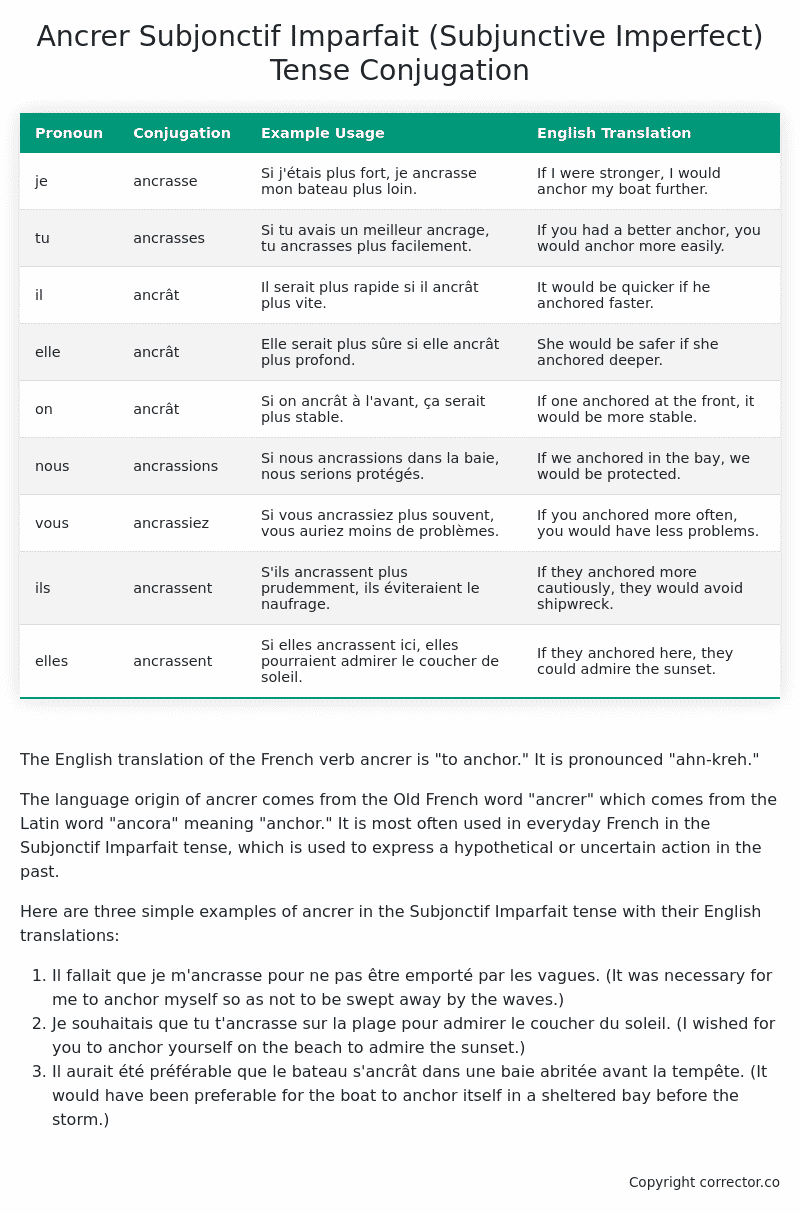Subjonctif Imparfait (Subjunctive Imperfect) Tense Conjugation of the French Verb ancrer
Introduction to the verb ancrer
The English translation of the French verb ancrer is “to anchor.” It is pronounced “ahn-kreh.”
The language origin of ancrer comes from the Old French word “ancrer” which comes from the Latin word “ancora” meaning “anchor.” It is most often used in everyday French in the Subjonctif Imparfait tense, which is used to express a hypothetical or uncertain action in the past.
Here are three simple examples of ancrer in the Subjonctif Imparfait tense with their English translations:
- Il fallait que je m’ancrasse pour ne pas être emporté par les vagues. (It was necessary for me to anchor myself so as not to be swept away by the waves.)
- Je souhaitais que tu t’ancrasse sur la plage pour admirer le coucher du soleil. (I wished for you to anchor yourself on the beach to admire the sunset.)
- Il aurait été préférable que le bateau s’ancrât dans une baie abritée avant la tempête. (It would have been preferable for the boat to anchor itself in a sheltered bay before the storm.)
Table of the Subjonctif Imparfait (Subjunctive Imperfect) Tense Conjugation of ancrer
| Pronoun | Conjugation | Example Usage | English Translation |
|---|---|---|---|
| je | ancrasse | Si j’étais plus fort, je ancrasse mon bateau plus loin. | If I were stronger, I would anchor my boat further. |
| tu | ancrasses | Si tu avais un meilleur ancrage, tu ancrasses plus facilement. | If you had a better anchor, you would anchor more easily. |
| il | ancrât | Il serait plus rapide si il ancrât plus vite. | It would be quicker if he anchored faster. |
| elle | ancrât | Elle serait plus sûre si elle ancrât plus profond. | She would be safer if she anchored deeper. |
| on | ancrât | Si on ancrât à l’avant, ça serait plus stable. | If one anchored at the front, it would be more stable. |
| nous | ancrassions | Si nous ancrassions dans la baie, nous serions protégés. | If we anchored in the bay, we would be protected. |
| vous | ancrassiez | Si vous ancrassiez plus souvent, vous auriez moins de problèmes. | If you anchored more often, you would have less problems. |
| ils | ancrassent | S’ils ancrassent plus prudemment, ils éviteraient le naufrage. | If they anchored more cautiously, they would avoid shipwreck. |
| elles | ancrassent | Si elles ancrassent ici, elles pourraient admirer le coucher de soleil. | If they anchored here, they could admire the sunset. |
Other Conjugations for Ancrer.
Le Present (Present Tense) Conjugation of the French Verb ancrer
Imparfait (Imperfect) Tense Conjugation of the French Verb ancrer
Passé Simple (Simple Past) Tense Conjugation of the French Verb ancrer
Passé Composé (Present Perfect) Tense Conjugation of the French Verb ancrer
Futur Simple (Simple Future) Tense Conjugation of the French Verb ancrer
Futur Proche (Near Future) Tense Conjugation of the French Verb ancrer
Plus-que-parfait (Pluperfect) Tense Conjugation of the French Verb ancrer
Passé Antérieur (Past Anterior) Tense Conjugation of the French Verb ancrer
Futur Antérieur (Future Anterior) Tense Conjugation of the French Verb ancrer
Subjonctif Présent (Subjunctive Present) Tense Conjugation of the French Verb ancrer
Subjonctif Passé (Subjunctive Past) Tense Conjugation of the French Verb ancrer
Subjonctif Imparfait (Subjunctive Imperfect) Tense Conjugation of the French Verb ancrer (this article)
Subjonctif Plus-que-parfait (Subjunctive Pluperfect) Tense Conjugation of the French Verb ancrer
Conditionnel Présent (Conditional Present) Tense Conjugation of the French Verb ancrer
Conditionnel Passé (Conditional Past) Tense Conjugation of the French Verb ancrer
L’impératif Présent (Imperative Present) Tense Conjugation of the French Verb ancrer
L’infinitif Présent (Infinitive Present) Tense Conjugation of the French Verb ancrer
Struggling with French verbs or the language in general? Why not use our free French Grammar Checker – no registration required!
Get a FREE Download Study Sheet of this Conjugation 🔥
Simply right click the image below, click “save image” and get your free reference for the ancrer Subjonctif Imparfait tense conjugation!

Ancrer – About the French Subjonctif Imparfait (Subjunctive Imperfect) Tense
Formation
Common Everyday Usage Patterns
Interactions with Other Tenses
Subjonctif Présent
Indicatif Passé Composé
Conditional
Conditional Perfect
Summary
I hope you enjoyed this article on the verb ancrer. Still in a learning mood? Check out another TOTALLY random French verb conjugation!


